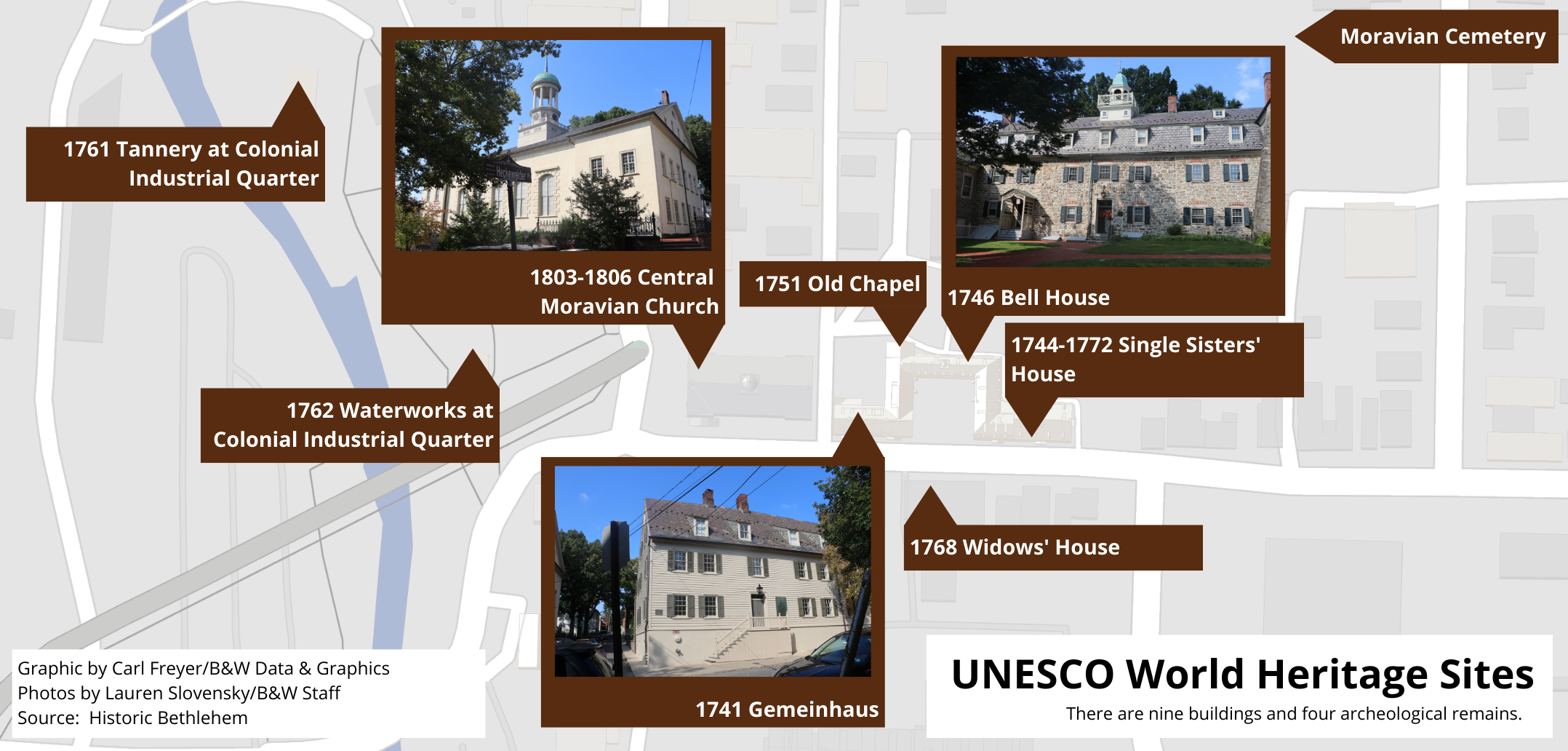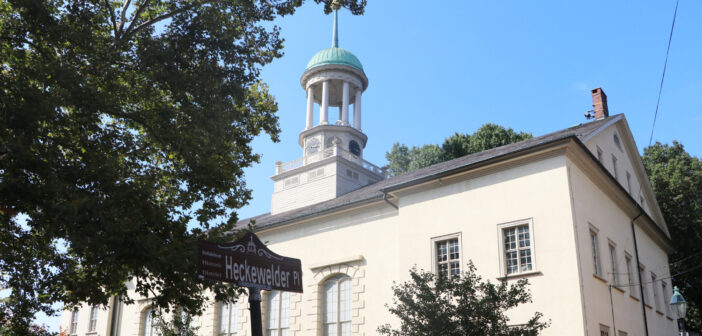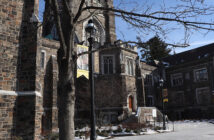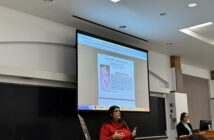On July 26, the United Nations Educational, Scientific and Cultural Organization (UNESCO) designated Bethlehem’s Moravian Church Settlements a World Heritage Site.
The decision came following the World Heritage Committee’s meeting in New Delhi, India, when the group approved the new additions to the program.
According to the UNESCO World Heritage Policy Compendium, the committee meets annually to inscribe new sites that follow the criteria of the “5Cs”: credibility, conservation, capacity-building, communication and communities.
The push for recognition of the Moravian churches’ history in Bethlehem began far before the meeting in New Delhi.
Charlene Donchez Mowers, senior advisor to Historic Bethlehem Museums & Sites and senior advisor and historian for the Bethlehem World Heritage Council and Commission, attended the first meeting to discuss the beginning steps of inscribing the Moravian Church Settlements 22 years ago in Bethlehem.
“The first meeting was actually a meeting with representatives of some international organizations and the historic Moravian community of Christiansfeld in Denmark looking to work with Bethlehem and other key historic Moravian communities that were well-preserved (and) built by the Moravian Church in the 1700s,” Donchez Mowers said.
After that initial visit, the late Rev. Doug Caldwell, former Bethlehem Mayor Don Cunningham and Donchez Mowers agreed to meet with other key historic Moravian settlements to form the international Moravian Heritage Network.
With that began a series of international meetings to discuss the goal of having key international historic Moravian sites on the UNESCO World Heritage List.
There are various steps countries must take place on the Tentative Lists for eventual nomination to the World Heritage List, and Donchez Mowers said this complicated the process for Bethlehem.
She said a cultural or heritage site in the U.S. must be designated as a National Historic Landmark to be eligible to apply for placement on the U.S. Tentative List. Once on the Tentative List, the country can then select a site to nominate for the World Heritage List.
The Bethlehem Moravian Church Settlements received a high degree of authenticity after being reviewed during the initial visit, but the Tentative World Heritage List had been closed for 17 years.
Donchez Mowers said when the list reopened for three months in 2008, she took the opportunity to write a nomination for the 1762 Bethlehem Waterworks and the 1741 Gemeinhaus Museum before the list closed again for another eight or nine years.
“The National Park Service came back to us and said we would be listed as pending on the Tentative List, but they felt very strongly that we really needed to have a landmark district…to ensure that we had a common story to tell because we had this transnational serial nomination,” Donchez Mowers said.

In 2015, seven years after Donchez Mowers submitted the nomination, Christiansfeld was inscribed on the World Heritage List. In 2021, representatives from Bethlehem, Gracehill and Hernnhut signed a Voluntary Association Agreement, officially recognizing the groups’ work.
The Nomination Dossier, the official document needed for UNESCO inscription, was submitted in 2023 and reviewed by the international committee.
On July 26, Donchez Mower and the team’s mission was complete.
Pennsylvania is now one of nine states in the U.S. with more than one UNESCO World Heritage Site. Other Word Heritage sites in Pennsylvania include Independence Hall in Philadelphia and Fallingwater, a house built by architect Frank Lloyd Wright over a waterfall on the Bear Run River. Sites across the world include the Roman Colosseum, Taj Mahal and Pyramids of Giza.
According to the Historic Bethlehem Museum & Sites, Bethlehem’s Moravian Church Settlements is one of 49 transboundary sites — sites on the territory of all concerned States parties having adjacent borders — out of the 1,223 international properties.
The Bethlehem sites are in conjunction with Moravian Churches in Gracehill, Ireland, Hernnhut, Germany, and Christiansfeld, Denmark, which were created to preserve the history of international Moravian churches.
However, Donchez Mowers said the work of her team still isn’t over after the inscription of the Moravian Church Settlements.
LoriAnn Wukitsch, CEO and president of Historic Bethlehem Museums & Sites, said the work is just starting.
Historic Bethlehem Museums & Sites is working with the other World Heritage Council members — Bethlehem Area Moravians, City of Bethlehem, Central Moravian Church and Moravian University — to restore and enhance World Heritage Sites.
“We’ve been preparing and working on specific historic restoration projects,” Wukitsch said. “We are ready for the local, regional, national and international visitors.”
Cheryl Matherly, Lehigh’s vice president and vice provost for international affairs, said she’s been in contact with Wukitsch, and the project is in the early stages.
Lehigh has a plan called “The Shared Bethlehem Experience,” a program that aims to immerse itself into Bethlehem’s community, culture and history.
Matherly said the site offers a symbiotic relationship for both Bethlehem and Lehigh, and there is an interest in creating internships and courses about the UNESCO site.
This could include possible engineering projects involving historic restoration and history classes.
Phillip Krupp, ‘25, a civil engineering major at Lehigh, said he believes historic restoration projects could be great for his peers, as most sophomores and juniors in his major are enrolled in engineering classes that don’t provide hands-on experiences.
He said students may find it interesting to learn about the maintenance of these sites while keeping structural integrity and upholding building codes.
“Seeing something translate from the classroom directly to the field is really important to me in terms of learning,” Krupp said.
In spring 2025, there will be an official celebration to commemorate the historic UNESCO World Heritage Site in Bethlehem.
Donchez Mowers said the site is significant, and this is a symbolic moment since the Moravian Church Settlements are part of the 26th transnational site of the world, were inscribed on the 26th and the Moravian star has 26 points.






Comment policy
Comments posted to The Brown and White website are reviewed by a moderator before being approved. Incendiary speech or harassing language, including comments targeted at individuals, may be deemed unacceptable and not published. Spam and other soliciting will also be declined.
The Brown and White also reserves the right to not publish entirely anonymous comments.